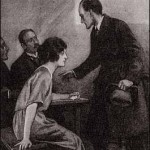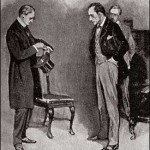“I did exactly what you advised.”
“Did you find your brougham?”
“Yes, it was waiting.”
“Did you recognize your coachman?”
“No.”
“It was my brother Mycroft. It is an advantage to get about in such a case without taking a mercenary into your confidence. But we must plan what we are to do about Moriarty now.”
“As this is an express, and as the boat runs in connection with it, I should think we have shaken him off very effectively.”
“My dear Watson, you evidently did not realize my meaning when I said that this man may be taken as being quite on the same intellectual plane as myself. You do not imagine that if I were the pursuer I should allow myself to be baffled by so slight an obstacle. Why, then, should you think so meanly of him?”
“What will he do?”
“What I should do.”
“What would you do, then?”
“Engage a special.”
“But it must be late.”
“By no means. This train stops at Canterbury; and there is always at least a quarter of an hour’s delay at the boat. He will catch us there.”
“One would think that we were the criminals. Let us have him arrested on his arrival.”
“It would be to ruin the work of three months. We should get the big fish. but the smaller would dart right and left out of the net. On Monday we should have them all. No, an arrest is inadmissible.”
“What then?”
“We shall get out at Canterbury.”
“And then?”
“Well, then we must make a cross-country journey to Newhaven, and so over to Dieppe. Moriarty will again do what I should do. He will get on to Paris, mark down our luggage, and wait for two days at the depot. In the meantime we shall treat ourselves to a couple of carpet-bags, encourage the manufactures of the countries through which we travel, and make our way at our leisure into Switzerland, via Luxembourg and Basle.”
At Canterbury, therefore, we alighted, only to find that we should have to walt an hour before we could get a train to Newhaven.
I was still looking rather ruefully after the rapidly disappearing luggage-van which contained my wardrobe, when Holmes pulled my sleeve and pointed up the line.
“Already, you see,” said he.
Far away, from among the Kentish woods there rose a thin spray of smoke. A minute later a carriage and engine could be seen flying along the open curve which leads to the station. We had hardly time to take our place behind a pile of luggage when it passed with a rattle and a roar, beating a blast of hot air into our faces.
“There he goes,” said Holmes, as we watched the carriage swing and rock over the points. “There are limits, you see, to our friend’s intelligetnce. It would have been a coup-de-maitre had he deduced what I would deduce and acted accordingly.”
“And what would he have done had he overtaken us?”
“There cannot be the least doubt that he would have made a murderous attack upon me. It is, however, a game at which two may play. The question now is whether we should take a premature lunch here, or run our chance of starving before we reach the buffet at Newhaven.”
We made our way to Brussels that night and spent two days there, moving on upon the third day as far as Strasbourg. On the Monday morning Holmes had telegraphed to the London police, and in the evening we found a reply waiting for us at our hotel. Holmes tore it open, and then with a bitter curse hurled it into the grate.
“I might have known it!” he groaned. “He has escaped!”
“Moriarty?”
“They have secured the whole gang with the exception of him. He has given them the slip. Of course, when I had left the country there was no one to cope with him. But I did think that I had put the game in their hands. I think that you had better return to England, Watson.”
“Why?”
“Because you will find me a dangerous companion now. This man’s occupation is gone. He is lost if he returns to London. If I read his character right he will devote his whole energies to revenging himself upon me. He said as much in our short interview, and I fancy that he meant it. I should certainly recommend you to return to your practice.”
It was hardly an appeal to be successful with one who was an old campaigner as well as an old friend. We sat in the Strasbourg salle-a-manger arguing the question for half an hour, but the same night we had resumed our journey and were well on our way to Geneva.
For a charming week we wandered up the valley of the Rhone, and then, branching off at Leuk, we made our way over the Gemmi Pass, still deep in snow, and so, by way of Interlaken, to Meiringen. It was a lovely trip, the dainty green of the spring below, the virgin white of the winter above; but it was clear to me that never for one instant did Holmes forget the shadow which lay across him. In the homely Alpine villages or in the lonely mountain passes, I could still tell by his quick glancing eyes and his sharp scrutiny of every face that passed us, that he was well convinced that, walk where we would, we could not walk ourselves clear of the danger which was dogging our footsteps
Once, i remember, as we passed over the Gemmi, and walked along the border of the melancholy Daubensee, a large rock which had been dislodged from the ridge upon our right clattered down and roared into the lake behind us. In an instant Holmes had raced up on to the ridge, and, standing upon a lofty pinnacle, craned his neck in every direction. It was in vain that our guide assured him that a fall of stones was a common chance in the springtime at that spot. He said nothing, but he smiled at me with the air of a man who sees the fulfilment of that which he had expected.
And yet for all his watchfulness he was never depressed. On the contrary, I can never recollect having seen him in such exuberant spirits. Again and again he recurred to the fact that if he could be assured that society was freed from Professor Moriarty he would cheerfully bring his own career to a conclusion.
“I think that I may go so far as to say, Watson, that I have not lived wholly in vain,” he remarked. “If my record were closed to-night I could still survey it with equanimity. The air of London is the sweeter for my presence. In over a thousand cases I am not aware that I have ever used my powers upon the wrong side. Of late I have been tempted to look into the problems furnished by nature rather than those more superficial ones tor which our artificial state of society is responsible. Your memoirs will draw to an end, Watson, upon the day that I crown my career by the capture or extinction of the most dangerous and capable criminal in Europe.”
I shall be brief, and yet exact, in the little which remains for me to tell. It is not a subject on which I would willingly dwell, and yet I am conscious that a duty devolves upon me to omit no detail.
It was on the third of May that we reached the little village of Meiringen, where we put up at the Englischer Hof. then kept by Peter Steiler the elder. Our landlord was an intelligent man and spoke excellent English, having served for three years as waiter at the Grosvenor Hotel in London. At his advice, on the afternoon of the fourth we set off together, with the intention of crossing the hills and spending the night at the hamlet of Rosenlaui. We had strict injunctions, however, on no account to pass the falls of Reichenbach, which are about halfway up the hills, without making a small detour to see them.
It is, indeed, a fearful place. The torrent, swollen by the melting snow, plunges into a tremendous abyss, from which the spray rolls up like the smoke from a burning house. The shaft into which the river hurls itself is an immense chasm, lined by glistening coal-black rock, and narrowing into a creaming, boiling pit of incalculable depth, which brims over and shoots the stream onward over its jagged lip. The long sweep of green water roaring forever down, and the thick flickering curtain of spray hissing forever upward, turn a man giddy with their constant whirl and clamour. We stood near the edge peering down at the gleam of the breaking water far below us against the black rocks, and listening to the half-human shout which came booming up with the spray out of the abyss.


